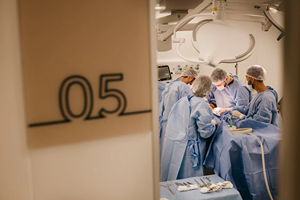Introduction
Navigating the world of surgery is undoubtedly a complex journey. While most people focus on the procedure itself, what often gets overlooked is the critical importance of post-operative care. The aftermath of surgery can be just as pivotal to a patient's recovery as the surgical procedure. Inadequate post-operative care can lead to a host of complications and injuries that may not only prolong recovery time but also lead to severe health consequences.
In this comprehensive guide, we'll explore "The Dangers of Poor Post-Operative Care and Common Injuries," shedding light on what constitutes good post-operative care, common pitfalls, and how to mitigate risks effectively. So, whether you're a patient preparing for surgery or a caregiver aiming to provide optimal support, this article will equip you with essential knowledge.
The Dangers of Poor Post-Operative Care and Common Injuries
Poor post-operative care can open the door to various complications, some of which may require additional medical interventions or even prolonged hospitalization. Understanding these dangers can empower both patients and caregivers to take proactive measures in their recovery journey.
Understanding Post-Operative Care
Post-operative care encompasses all the medical and supportive measures taken after surgery. This includes pain management, wound care, monitoring vital signs, nutritional support, physical therapy, and more. Each element plays a crucial role in ensuring that patients recover smoothly without encountering unforeseen complications.
Common Complications Due to Poor Care
Infections- Surgical site infections (SSIs) are one of the most prevalent complications following surgery. Symptoms include redness, swelling, increased pain at the site, and sometimes fever.
- Deep vein thrombosis (DVT) can develop if patients remain immobile for too long after surgery. Symptoms include swelling in one leg, pain or tenderness in the leg, and warm skin over the affected area.
- Insufficient nutrition or inadequate wound care can hinder healing processes. Patients may experience prolonged discomfort or require further medical treatment.
- Patients may face complications like pneumonia if they do not engage in deep breathing exercises. Signs include coughing up greenish or yellow mucus, shortness of breath, and fever.
- The stress associated with inadequate recovery environments can affect mental well-being. Anxiety and depression are common among patients who experience setbacks during recovery.
Importance of Effective Communication
One major aspect that cannot be overlooked is communication between healthcare providers and patients. A clear line of communication ensures that every party understands postoperative instructions fully—be it regarding medication schedules or activity restrictions.
How Can Patients Ensure They Receive Proper Instructions?
- Ask questions: If something isn't clear about your post-operative plan, don’t hesitate to ask. Take notes: Writing down instructions can help you remember them better later. Involve family members: Having someone else listen can ensure that important details aren’t missed.
Signs That Indicate Poor Post-Operative Care
Recognizing signs indicating poor post-operative care is crucial for timely intervention. Here’s what you should watch out for:
Abnormal Vital Signs
Monitoring vital signs such as heart rate, blood pressure, temperature, and respiratory rate is essential in post-operative settings.
- High Fever: A significant concern that could indicate infection. Low Blood Pressure: Could suggest bleeding or shock.
Wound Assessment
Regular inspection of wounds is vital for identifying issues early on:
- Excessive Bleeding: May signify an uncontrolled clot or an opening incision. Pus Formation: Indicates possible infection requiring immediate attention.
Physical Symptoms
Patients should be aware of any unusual physical symptoms:
- Persistent Pain: Pain that worsens instead of improving could signal complications. Nausea/Vomiting: These symptoms may indicate digestive issues related to anesthesia or medications.
Post-Operative Care Best Practices
Being informed about best practices in post-operative care can significantly enhance recovery outcomes.
Pain Management Techniques
Effective pain management is paramount!
Medications: Following prescribed medication regimens diligently helps control pain levels effectively. Alternative Therapies: Techniques such as acupuncture or massage therapy might complement traditional pain relief methods.Wound Care Protocols
Proper wound care minimizes infection risks:
http://pediatric-errors-tips-insight.yousher.com/the-emotional-toll-of-medical-errors-and-how-to-cope Keep it clean: Regularly change dressings according to medical advice. Monitor Changes: Be vigilant about any changes in color or discharge from the wound site.Nutritional Support After Surgery
Nutrition plays a pivotal role in recovery:
Protein Intake: Essential for tissue repair; lean meats, eggs, beans are great sources! Hydration Matters! Keeping hydrated aids overall bodily functions during recovery phases.
Physical Activity Guidelines Post-Surgery
Understanding when and how much physical activity is appropriate after surgery can make a significant difference in recovery speed.
Initial Rest Periods Are Crucial
After surgery:
Get plenty of rest immediately following surgery; your body needs time to heal! Follow your surgeon's guidelines regarding permissible activities during initial days after discharge from the hospital.Progressing Gradually with Physical Activity
As you start feeling better:
Light Activities: Begin with gentle movements like sitting up slowly or taking short walks around your home. Avoid Strenuous Activities Initially: Heavy lifting or intense workouts should wait until you receive clearance from your healthcare provider.The Role of Healthcare Providers in Ensuring Quality Care
Healthcare providers play an instrumental role in ensuring quality postoperative outcomes through diligent monitoring and patient education strategies tailored specifically for each case!
Preoperative Education Importance
Before undergoing surgery:
Discuss potential risks associated with poor postoperative care openly with your healthcare team! Understand what specific instructions relate directly back to your type of procedure!Is Continuous Monitoring Necessary?
Absolutely! Regular check-ups ensure any early signs signaling problems get addressed promptly!
FAQs
Q1: What are common injuries due to poor post-operative care?
A: Common injuries include infections at surgical sites, blood clots (DVT), delayed wound healing, respiratory issues like pneumonia, and psychological impacts such as anxiety or depression due to inadequate support systems during recovery periods.
Q2: How important is communication between patient & healthcare providers?
A: It's absolutely crucial! Clear communication helps ensure proper understanding regarding medication schedules & other necessary instructions leading towards optimal recoveries without complications arising unexpectedly!


Q3: What signs indicate I need immediate medical attention after surgery?
A: Seek immediate attention if experiencing high fevers (over 101°F), excessive bleeding from surgical sites; severe persistent pains not alleviating with prescribed medications; unusual discharge from wounds (pus formation); nausea/vomiting lasting longer than 24 hours etc…
Q4: Can poor nutrition affect my recovery process?
A: Yes! Proper nutrition supports tissue repair while enhancing overall health during recuperation phases—deficiencies could lead towards slowed recoveries resulting from weaker immune responses allowing infections room-to-gain ground!
Q5: When should I start physical therapy sessions?
A: Consult your surgeon before initiating any form exercise program—typically light stretching/walking begins within days following discharge while intensive therapies aren’t recommended until full-clearance provided by your physician!
Q6: How do I know if my wound is healing properly?
A: Look out for reduced swelling over time; observe color changing back towards normal skin tones; absence/decline rates concerning drainage amounts—if anything appears abnormal consult professionals right away!
Conclusion
In summary, "The Dangers of Poor Post-Operative Care and Common Injuries" serve as reminders that effective postoperative management goes hand-in-hand with surgical success! Awareness surrounding potential pitfalls alongside proactive measures ensures smoother transitions into recovery periods whilst minimizing risks presented via neglectful practices throughout those crucial stages thereafter operations take place! Prioritizing good communication channels coupled alongside adherence toward prescribed protocols fosters environments where healing thrives unencumbered by avoidable setbacks experienced otherwise!